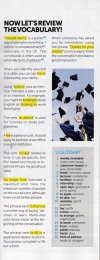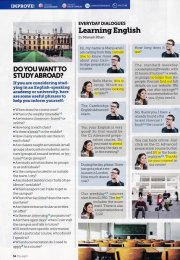 Good morning, afternoon, evening
Good morning, afternoon, evening
Silvia, Flavio, Giuliana, Luca, Daniele B., Daniele L., Sara, Loretto, Federica, Michela, Michele, Elisa, Manuela, Marco,
going to school and studying is a subject we would like you to think a little about.
After reading the article, even if you haven't ever studied abroad, write a comment about yourself or your kids nowadays and their experience at school. Focus on the acquisition of a second language, possibly English, and write what your reflections are.
Collecting data and comparing them with what happens in our class can be a contribute to become aware of methods that have to be applied, of which methodology is to be encouraged, and of how many other elements play a significant role in becoming bi/multilingual.
How many languages are spoken in your family environment?
Do you feel to be open to other languages to be practiced at home?
How do you pursue such an objective?
What are your feelings when applying yourself to the acquisition of a second language?
Why are you interested in the acquisition of English as a second Language? Which is your motivation?
Following there are just a few lines to present you a tense sometimes quite difficult for Italian students to cope with.
Present Perfect
We use the Present Perfect Tense when
- we want to focus on the present effect of a recent event. Is the director here? No he has left.
- there is new information. The police have arrested two men in connection with the robbery.
- we want to talk about a period of time that continues from the past until now. Have you ever been to Japan?/eaten suschi? (in your life until now) Yes, I have. When did you go there? /did you eat it?
- it is the first time that something has happened. This is the first time I have ridden a horse!
- we want to talk about something that started in the past and still continues now. How long has he lived here? He has lived here for three years/since 2015. With verbs like known, lived, had we use present perfect simple, otherwise the continuous is more usual and it is for an activity that is still happening. She has been watcching television all day!
When using the present perfect continuous we are interested in the activity and it doesn't matter whether it has been finished or not. She has been cleaning the car. (She is wet because of using water). She has cleaned the car (The car is very clean). The action is completed, we are interested in the car.
With how much, how many or how many times we use present perfect simple for completed actions. How many films by Quentin Tarantino have you seen?
Write a few sentences of your own using these samples thinking of your classmates. Come to class ready to practice them in a proper and accurate interaction.
Enjoy your English and share it with everybody else as behaviour, experience, vitality, life, one more identity to perform interacting joyfully.
(Try to find the right order of the pages by yourself, sometimes technology is not fully helpful).
Good contribution Federica and Michela, your comments on the page! Enthusiasm is fifty per cent of a good job. We'll talk about them in class with all mates. Inaccuracies do not impeed comprehension, communication works!
Anna - Coordinator
Source: Speak Up October 2018
Let us know and come to class ready to speak about that.


